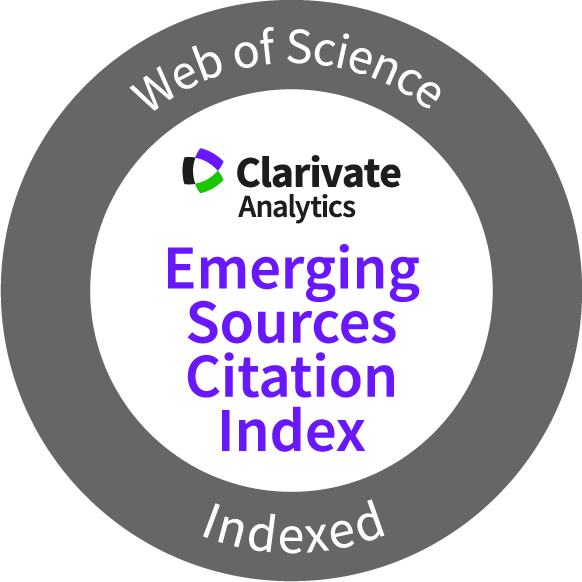In silico elucidation of protein-protein interaction network in fish pathogen Flavobacterium Columnare
Keywords:
Flavobacterium columnaris, columnaris, in silico, hub proteins, therapeutic targetsAbstract
Flavobacterium columnare is a virulent intracellular bacterial pathogen that causes an infection known as columnaris in many species of fish. Some economically important fish species are strongly affected by columnaris, leading to a high mortality rate and significant economic losses. Previous in silico studies have provided various biological insights into F. columnare, including its interaction with MHC class I alleles and the epitopic region within outer membrane proteins. However, the protein-protein interaction networks underlying the growth, defense, and pathogenesis of F. columnare remain largely unknown. This study was conducted to identify the protein-protein interaction (PPI) networks and hub proteins of F. columnare that can be used as drug or vaccine targets. A total of 500 protein sequences were retrieved from UniprotKB in FASTA format and analyzed using VaxiJen, PSORTb, STRING, Cytoscape, and BLASTp programs. The results demonstrated that 60% of F. columnare proteins were predicted as antigenic proteins, most of which were associated with catalytic activity and metabolic processes, identified as cytoplasmic proteins. Ten hub proteins with the highest number of functional interactions were identified, which were also antigenic and non-host homologous. In conclusion, F. columnare hub proteins represent potential therapeutic targets in drug and vaccine development against columnaris infection.
Downloads
Metrics
References
Abd Rashid, S.A., Yaacob, M.F., Anuar, N.R.T., Johari, N., Kamaruzaman, A.N.A., Yunus, N.M. & Yahya, M.F.Z.R. 2022. A combination of in silico subtractive and reverse vaccinology approaches reveals potential vaccine targets in Corynebacterium pseudotuberculosis. Journal of Sustainability Science and Management, 17(1): 99-109. DOI: https://doi.org/10.46754/jssm.2022.01.007
Bairoch, A. & Apweiler, R. 2000. The SWISS-PROT protein sequence database and its supplement TrEMBL in 2000. Nucleic acids research, 28(1): 45-48. DOI: https://doi.org/10.1093/nar/28.1.45
Balint, D. & Brito, I.L. 2023. Human-gut bacterial protein-protein interactions: understudied but impactful to human health. Trends in Microbiology, S0966-842X(23)00271-8.
Bhattacharya, M., Malick, R.C., Mondal, N., Patra, P., Pal, B.B., Patra, B.C. & Das, B.K. 2019. Computational characterization of epitopic region within the outer membrane protein candidate in Flavobacterium columnare for vaccine development. Journal of Biomolecular Structure and Dynamics, 38(2): 450-459. DOI: https://doi.org/10.1080/07391102.2019.1580222
Bulgakov, V.P. & Tsitsiashvili, G.S. 2013. Bioinformatics analysis of protein interaction networks: Statistics, topologies, and meeting the standards of experimental biologists. Biochemistry (Moscow), 78: 1098-1103. DOI: https://doi.org/10.1134/S0006297913100039
De Silva, L.A.D.S. & Heo, G.J. 2023. Biofilm formation of pathogenic bacteria isolated from aquatic animals. Archives of Microbiology, 205(1): 36. DOI: https://doi.org/10.1007/s00203-022-03332-8
Doytchinova, I.A. & Flower, D.R. 2007. VaxiJen: A server for prediction of protective antigens, tumour antigens and subunit vaccines. BMC Bioinformatics, 8: 1-7. DOI: https://doi.org/10.1186/1471-2105-8-4
Echlin, H., Frank, M., Rock, C. & Rosch, J.W. 2020. Role of the pyruvate metabolic network on carbohydrate metabolism and virulence in Streptococcus pneumoniae. Molecular microbiology, 114(4): 536-552. DOI: https://doi.org/10.1111/mmi.14557
Fotie, J. 2018. Inosine 5'-monophosphate dehydrogenase (IMPDH) as a potential target for the development of a new generation of Antiprotozoan agents. Mini Reviews in Medicinal Chemistry, 18(8): 656-671. DOI: https://doi.org/10.2174/1389557516666160620065558
Gestwicki, J.E. 2022. Multi-protein complexes as drug targets. Cell chemical biology, 29(5): 713-715. DOI: https://doi.org/10.1016/j.chembiol.2022.05.002
Guo, K., Li, J., Tang, J.P., Tan, C.P., Hong, C.W., Al-Aidaroos, A.Q., Varghese, L., Huang, C. & Zeng, Q. 2011. Targeting intracellular Oncoproteins with antibody therapy or vaccination. Science Translational Medicine, 3(99): 99ra85. DOI: https://doi.org/10.1126/scitranslmed.3002296
Hafsa, U., Chuwdhury, G.S., Hasan, M.K., Ahsan, T. & Moni, M.A. 2022. An in silico approach towards identification of novel drug targets in Klebsiella oxytoca. Informatics in Medicine Unlocked, 31: 100998. DOI: https://doi.org/10.1016/j.imu.2022.100998
Hassanien, H.A., Alrashada, Y.N., Abbas, A.O. & Abdelwahab, A.M. 2023. Dietary propolis complementation relieves the physiological and growth deterioration induced by Flavobacterium columnare infection in juveniles of common carp (Cyprinus carpio). Plos one, 18(10): e0292976. DOI: https://doi.org/10.1371/journal.pone.0292976
Heckman, T.I., Yazdi, Z., Pomaranski, E.K., Sebastião, F.D.A., Mukkatira, K., Vuglar, B.M., Cain, K.D., Loch, T.P. & Soto, E. 2023. Atypical flavobacteria recovered from diseased fish in the Western United States. Frontiers in Cellular and Infection Microbiology, 13: 1149032. DOI: https://doi.org/10.3389/fcimb.2023.1149032
Hosfelt, J., Richards, A., Zheng, M., Adura, C., Nelson, B., Yang, A., Fay, A., Resager, W., Ueberheide, B., Glickman, J.F. & Lupoli, T.J. 2022. An allosteric inhibitor of bacterial Hsp70 chaperone potentiates antibiotics and mitigates resistance. Cell Chemical Biology, 29(5): 854-869. DOI: https://doi.org/10.1016/j.chembiol.2021.11.004
Isa, S.F.M., Hamid, U.M.A. & Yahya, M.F.Z.R. 2022. Treatment with the combined antimicrobials triggers proteomic changes in P. aeruginosa-C. albicans polyspecies biofilms. ScienceAsia, 48(2): 215-222. DOI: https://doi.org/10.2306/scienceasia1513-1874.2022.020
Johari, N.A., Aazmi, M.S. & Yahya, M.F.Z.R. 2023. FTIR spectroscopic study of inhibition of chloroxylenol-based disinfectant against Salmonella enterica serovar Thyphimurium biofilm. Malaysian Applied Biology, 52(2): 97-107. DOI: https://doi.org/10.55230/mabjournal.v52i2.2614
Kamaruzzaman, A.N.A., Mulok, T.E.T.Z., Nor, N.H.M. & Yahya, M.F.Z.R. 2022. FTIR spectral changes in Candida albicans biofilm following exposure to antifungals. Journal of Malaysian Applied Biology, 51(4): 57-66. DOI: https://doi.org/10.55230/mabjournal.v51i4.11
Kim, H., Ryu, J.W., Lee, Y.K., Park, B.N., Kang, T.H., Yeo, M.H., Yoo, J.S. & Chung, J.S. 2010. Essentiality of hub proteins in protein-protein interaction networks of yeast. Journal of the Korean Physical Society, 56(5): 1527-1531. DOI: https://doi.org/10.3938/jkps.56.1527
Lange, S.S., Takata, K. & Wood, R.D. 2021. DNA polymerases and cancer. Nature reviews. Cancer, 11(2): 96-110. DOI: https://doi.org/10.1038/nrc2998
Liu, Z., Liu, S., Yao, J., Bao, L., Zhang, J., Li, Y., Sun, L., Wang, R., Zhang, Y., Zhou, T., Zeng, Q., Fu, Q., Gao, S., Li, N., Koren, S., Jiang, Y., Zimin, A., Xu, P., Phillippy, A.M., Geng, X., Song, L., Sun, F., Li, C., Wang, X., Chen, A., Jin, Y., Yuan, Z., Yang, Y., Tan, S., Peatman, E., Lu, J., Qin, Z., Dunham, R., Li, Z., Sonstegard, T., Feng, J., Danzmann, R.G., Schroeder, S., Scheffler, B., Duke, M.V., Ballard, L., Kucuktas, H., Kaltenboeck, L., Liu, H., Armbruster, J., Xie, Y., Kirby, M.L., Tian, Y., Flanagan, M.E., Mu, W. & Waldbieser, G.C. 2016. The channel catfish genome sequence provides insights into the evolution of scale formation in teleosts. Nature communications, 7: 11757. DOI: https://doi.org/10.1038/ncomms11757
Mahendran, R., Jeyabaskar, S., Sitharaman, G., Michael, R.D. & Paul, A.V. 2016. Computer-aided vaccine designing approach against fish pathogens Edwardsiella tarda and Flavobacterium columnare using bioinformatics softwares. Drug design, development and therapy, 10: 1703-1714. DOI: https://doi.org/10.2147/DDDT.S95691
Martina, P., Feliziani, S., Juan, C., Bettiol, M., Gatti, B., Yantorno, O., Smania, A.M., Oliver, A. & Bosch, A. 2014. Hypermutation in Burkholderia cepacia complex is mediated by DNA mismatch repair inactivation and is highly prevalent in cystic fibrosis chronic respiratory infection. International Journal of Medical Microbiology, 304(8): 1182-1191. DOI: https://doi.org/10.1016/j.ijmm.2014.08.011
Mendez-Rios, J. & Uetz, P. 2010. Global approaches to study protein-protein interactions among viruses and hosts. Future microbiology, 5(2): 289-301. DOI: https://doi.org/10.2217/fmb.10.7
Osman, K.M., Ali, M.N., Radwan, I., ElHofy, F., Abed, A.H., Orabi, A. & Fawzy, N.M. 2016. Dispersion of the vancomycin resistance genes van A and van C of Enterococcus isolated from Nile Tilapia on retail sale: A public health hazard. Frontiers in microbiology, 7: 1354. DOI: https://doi.org/10.3389/fmicb.2016.01354
Othman, N.A. & Yahya, M.F.Z.R. 2019. In silico analysis of essential gene and non-homologous proteins in Salmonella typhimurium biofilm. Journal of Physics: Conference Series, 1349: 012133. DOI: https://doi.org/10.1088/1742-6596/1349/1/012133
Prava, J. & Pan, A. 2022. In silico analysis of Leishmania proteomes and protein-protein interaction network: Prioritizing therapeutic targets and drugs for repurposing to treat leishmaniasis. Acta Tropica, 229: 106337. DOI: https://doi.org/10.1016/j.actatropica.2022.106337
Rosilan, N.F., Waiho, K., Fazhan, H., Sung, Y.Y., Nor, S.A.M., Muhammad, N.A.N., Mohamed-Hussien, Z.A. & Afiqah-Aleng, N. 2023. Protein-protein interaction network analysis on the whiteleg shrimp Penaeus vannamei and Vibrio parahaemolyticus host-pathogen relationship reveals possible proteins and pathways involved during infection. Aquaculture Reports, 30: 101583. DOI: https://doi.org/10.1016/j.aqrep.2023.101583
Salod, Z. & Mahomed, O. 2022. Mapping potential vaccine candidates predicted by VaxiJen for different viral pathogens between 2017-2021-A scoping review. Vaccines, 10(11): 1785. DOI: https://doi.org/10.3390/vaccines10111785
Sarker, S., Abraham, T.J. & Patra, A. 2019. Prevalence of diseases caused by Flavobacterium spp. and other opportunistic bacteria in carps of sewage-fed farms in West Bengal, India. Journal of Fisheries, 7(1): 663-670. DOI: https://doi.org/10.17017/j.fish.7
Szklarczyk, D., Kirsch, R., Koutrouli, M., Nastou, K., Mehryary, F., Hachilif, R., Gable, A.L., Fang, T., Doncheva, N., Pyysalo, S., Bork, P., Jensen, L. & Von Mering, C. 2023. The STRING database in 2023: protein-protein association networks and functional enrichment analyses for any sequenced genome of interest. Nucleic Acids Research, 51(D1): D638-D646. DOI: https://doi.org/10.1093/nar/gkac1000
Torrie, L.S., Brand, S., Robinson, D.A., Ko, E.J., Stojanovski, L., Simeons, Wyllie, S., Thomas, J., L, E., Osuna-Cabello, M., Epemolu, O., Nühs, A., Riley, J., MacLean, L., Manthri, S., Read, K.D., Gilbert, I.H., Fairlamb, A.H. & De Rycker, M. 2020. Chemical validation of methionyl-tRNA synthetase as a druggable target in Leishmania donovani. ACS Infectious Diseases, 3(10): 718-727. DOI: https://doi.org/10.1021/acsinfecdis.7b00047
Waiho, K., Afiqah-Aleng, N., Iryani, M.T.M. & Fazhan, H. 2021. Protein-protein interaction network: An emerging tool for understanding fish disease in aquaculture. Reviews in Aquaculture, 13(1): 156-177. DOI: https://doi.org/10.1111/raq.12468
Wang, S., Wu, R., Lu, J., Jiang, Y., Huang, T. & Cai, Y.D. 2022. Protein-protein interaction networks as miners of biological discovery. Proteomics, 22(15-16): 2100190. DOI: https://doi.org/10.1002/pmic.202100190
Wani, N. & Raza, K. 2019. Integrative approaches to reconstruct regulatory networks from multi-omics data: a review of state-of-the-art methods. Computational biology and chemistry, 83: 107120. DOI: https://doi.org/10.1016/j.compbiolchem.2019.107120
Wu, C., Zheng, W., Zhang, J. & He, X. 2022. Exploring the mechanism of curcumin on retinoblastoma based on network pharmacology and molecular docking. Evidence-based complementary and alternative medicine: eCAM, 2022: 2407462. DOI: https://doi.org/10.1155/2022/2407462
Yaacob, M.F., Murata, A., Nor, N.H.M., Jesse, F.F.A. & Yahya, M.F.Z.R. 2021. Biochemical composition, morphology and antimicrobial susceptibility pattern of Corynebacterium pseudotuberculosis biofilm. Journal of King Saud University-Science, 33(1): 101225. DOI: https://doi.org/10.1016/j.jksus.2020.10.022
Yahya, M.F.Z.R., Alias, Z. & Karsani, S.A. 2017. Subtractive protein profiling of Salmonella typhimurium biofilm treated with DMSO. The Protein Journal, 36(4): 286-298. DOI: https://doi.org/10.1007/s10930-017-9719-9
Yu, N. Y., Wagner, J. R., Laird, M. R., Melli, G., Rey, S., Lo, R., Dao, P., Sahinalp, S.C., Ester, M., Foster, L.J. & Brinkman, F. S. 2010. PSORTb 3.0: Improved protein subcellular localization prediction with refined localization subcategories and predictive capabilities for all prokaryotes. Bioinformatics, 26(13): 1608-1615. DOI: https://doi.org/10.1093/bioinformatics/btq249
Zainal-Abidin, R.A., Afiqah-Aleng, N., Abdullah-Zawawi, M.R., Harun, S. & Mohamed-Hussein, Z.A. 2022. Protein-protein interaction (PPI) network of Zebrafish oestrogen receptors: A bioinformatics workflow. Life, 12(5): 650. DOI: https://doi.org/10.3390/life12050650
Zulkiply, N., Ramli, M.E. & Yahya, M.F.Z.R. 2022. In silico identification of antigenic proteins in Staphylococcus aureus. Journal of Sustainability Science and Management, 17(2): 18-26. DOI: https://doi.org/10.46754/jssm.2022.02.002
Published
How to Cite
Issue
Section
Any reproduction of figures, tables and illustrations must obtain written permission from the Chief Editor (wicki@ukm.edu.my). No part of the journal may be reproduced without the editor’s permission




















